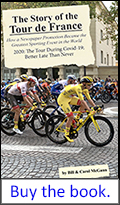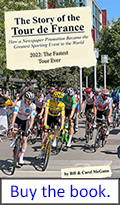

Bicycle Racing News and Opinion,
Saturday, October 8, 2022
Back to news and opinion index page for links to archived stories | Commentary | Our YouTube page
2021 Tour de France | 2022 Giro d'Italia
The cat could very well be man's best friend but would never stoop to admitting it. - Doug Larson

Bill & Carol McGann's book The Story of the Tour de France, 2020: The Tour During Covid-19, Better Late Than Never is available in both Kindle eBook and Audiobook versions. To get your copy, just click on the Amazon link on the right.
Current racing:
- Oct 8: Il Lombardia
Upcoming racing:
- Oct 9: Paris-Tours
- Oct 12: Giro del Veneto
- Oct 16: Japan Cup
- Oct 16: Veneto Classic
- Oct 16: Chrono des Nations
Latest completed racing:
- Oct 6: Gran Piemonte
- Oct 6: Paris-Bourges
- Oct 4: Tre Valli Varesine
- Oct 4: Binche-Chimay-Binche
- Oct 3: Sparkassen Münsterland Giro
- Oct 3: Coppa Bernocchi
- Oct 1: Giro dell'Emilia
Langeveld’s EF Education-EasyPost team sent me this press release:
After 17 seasons in the professional peloton, Sebastian Langeveld will pin on a number for the last time this Sunday at Paris-Tours. Once he has torn through the vineyards southwest of Paris with his teammates, his family and friends will be waiting to celebrate with him at the finish in Tours. When he crosses the line, he will call it a career. A new adventure awaits him: Sebastian will work as a sports director for our team next year. But first, Sebastian wants to enjoy his last race and help his teammates navigate those mad dashes down the French wine growers’ tracks.

Langeveld racing in the 2017 Paris-Roubaix. Sirotti photo
Never say never, but Sebastian’s career probably won’t end with a fairytale victory, as it started, when he won his second ever race. At 37, Sebastian can no longer quite find the form that made him one of the best classics riders of his generation. He will never brag about his list of results, but it includes a victory at Omloop Het Nieuwsblad, a podium at Paris-Roubaix, and fifth at the Ronde van Vlaanderen. Sebastian is an Olympian. He has represented the Netherlands ten times at the road world championships, ridden De Ronde 15 times, Roubaix 14 times, and done six Tours de France. Sebastian was the Dutch champion. He has raced for our team since 2014 and contributed to many of our best results. The role he played in the finale of Alberto Bettiol’s 2019 Tour of Flanders victory is just one example of the stellar work he has done for us in recent years. That Sebastian’s career has lasted as long as it has is a testament to his professionalism. Next year, our riders will listen to every word he shouts to them over the radio, because he has been a role model for them right up to his last race.
Sebastian’s best advice for them now is to enjoy bike racing.

“I now realize how special it is to do this,” he says. “I started cycling as a kid and it was just a hobby. I just liked riding my bike, and then it got more serious and I was making a living out of it, but I think you always have to remind yourself about the basics; what makes you happy on the bike and can you keep doing this? In 17 years, I have met so many people and seen so many things, being on the road with a great bunch of people. But if you’re living alone like a monk for three months at a time at altitude, and you don’t really enjoy it, that is going to make it pretty hard to have a long career.”
Sebastian has always tried to find ways to make the travel and training that come with life as a professional cyclist fun and sustainable. It takes enormous amounts of dedication and hard work to win top-class bike races. During his time as a racer, Sebastian has seen the sport become more and more competitive. It’s not that the best riders have got faster. The champions Sebastian raced against early in his career would still win the great races today. But the quality of the riders in the peloton has improved, especially in the spring classics that Sebastian loves most.
“The game is the same. It is still bike riding, and you have to be the first to get from A to B,” he says, “but the level of the field is higher. Ten years ago, in Flanders or Roubaix, you were maybe fighting to get to the front with 80 guys. There were 80 good guys for the classics. Now, all of the teams have their best riders there, and you are riding with 170 guys who are all in top shape, thanks to the nutrition knowledge everyone has, altitude camps, training camps, bikes, materiel. That makes it much harder to fight for position, and makes it a bit more dangerous. That’s cycling.”
Young riders now come into the sport with skills and knowledge that they would only have gained in their first couple of years as professionals when Sebastian was starting out. Most of them have been training with power meters since they were kids and already know how to eat properly and rest properly and look after their bodies, thanks to the knowledge on the internet.
Bike racing is not just a test of fitness though, especially at the top-level. The rigors of racing up to 80 days per year under pressure are hard to handle. Sebastian has learned how to deal with those pressures and perform year after year.
He was a phenom in his first year as a pro. He won the GP Pino Cerami in his second professional race and finished second at the Dutch championships that season. The world’s biggest teams were knocking down his door. He went to the top pro team in the Netherlands. Although he missed the classics the next spring due to a broken hand, he won the Ster Elektrotoer and was second again at the Dutch championships. The next spring, he was flying. He finished second at Kuurne-Brussels-Kuurne and was racing for the win in the finale at the Tour of Flanders. Every cycling fan in the Netherlands expected him to become the country’s next classics star.
“All of a sudden, I was doing the races I used to watch on the television,” Sebastian says. “I’d always supported the big names, Museeuw, Van Petegem, and there I was in the final of Flanders myself, which was sort of unreal.”
Sebastian’s team now expected him to win those races. In his early twenties, Sebastian sometimes struggled with the weight of those expectations.
“I was one of the leaders for the classics then,” he says. “And I always felt an immense amount of pressure on my shoulders, in a way that I almost didn’t enjoy it, which wasn’t a super nice period. You don’t win 95% of your races in cycling, and if you’re expected to win bike races… if I didn’t deliver, I sort of struggled with that. I didn’t really enjoy cycling for a little while.”
It was when he re-found his joy in cycling that Sebastian was at his best. Going to the Olympic Games in London and representing his country so many times at the world championships will always be some of his favorite memories. He’ll never forget the day Albert Bettiol won De Ronde or climbing onto the podium at Paris-Roubaix. He is proudest of his win at the Omloop Het Nieuwsblad, because that was one of the races that made him fall in love with cycling as a boy.
“That was one of my biggest victories,” he says. “Beating Juan Antonio Flecha, an old teammate of mine, in really terrible weather conditions was special. I haven’t won a lot, but that is probably the biggest one. I’m never going to be the guy who says, ‘I did this, won whatever, attacked here or there’, but in a few years, when I have to tell my children, your father was a bike rider, to be able to say to them that I won Het Nieuwsblad is a big thing. I am pretty proud of that race.”
Many of Sebastian’s favorite cycling memories weren’t victories though; it’s the trips on the bus, traveling around the world with good friends that he really treasures. When the vibe was good, he and his teammates raced well and kept racing well.
“If I look at my career, and the amount of joy it has given me, being on a bike, being on the road, with teammates, with staff, it is something that is pretty special. Back then, I didn’t really have the time to realize that it was something so good,” Sebastian says. “We all started cycling because we like it, because we enjoy riding bikes. It’s important to remember that.”
Now, Sebastian will ride his own bike less. He is really looking forward to spending a lot more quality time at home with his wife Tessa and their two sons Dylan and Dean who are three and six, without having to go off training.
“I am super grateful that I can make my own decision to stop my career now,” Sebastian says. “The time is right. Luckily, I am not one of those athletes who all of a sudden has to retire because they don’t have a contract or they are injured. I am still going to be on the road with a great bunch of people.”
It is going to be strange to see Sebastian climb into a team car at the classics next spring, and not roll off on his bike, ready to lead our team to the front of the peloton whatever the weather. But we know he will embrace his new role with all of the dedication he has shown during his 17 years as a pro, share his wisdom with our young riders, and help keep the races fun.
“I am really keen to put the same amount of passion and time into being a good DS and helping young riders out as I did as a cyclist,” he says.
Thank you Sebastian. Race your heart out one more time. We’re waiting for you in Tours to celebrate.
Here’s the team’s news:
This weekend marks Team Jumbo-Visma and the Development Team’s final classic cycling events of the year. Both teams will participate in Paris-Tours in France, while in Italy, the team is at the start of Il Lombardia, the season’s last cycling monument. Sports directors Addy Engels, Arthur van Dongen and Sierk Jan de Haan anticipate a successful end to an already successful cycling year.
In contrast to last year, Il Lombardia goes from Bergamo to Como. “The start of the race is now the final from last year. That will be challenging right away”, sports director Engels says. “The final is always quite difficult, while the middle part looks much easier. I anticipate a strong group, with the favourites only appearing in the front in the final.”
One of those favourites is Jonas Vingegaard. The Dane participated in the CRO Race to get ready for Lombardy. The Tour de France winner won two stages in the six-day stage race and came one second short of first place overall. “Jonas has shown that he is in good shape and feels good. He appeared at ease and made some solid efforts during the recon ride”, Engels says.

Jonas Vingegaard is headed to Lombardy. Sirotti photo
The Danish rider will, therefore, appear at the start in good shape. The Team Jumbo-Visma riders must climb several challenging hills in the final. This Saturday’s final will include the San Fermo Della Battaglia and the Civiglio twice. “It will explode on the San Fermo’s first pass. On the Civiglio, we must have one or two riders next to Jonas. After that, it’s up to him and a select group of top favourites who will fight for the win.”
The team will also start this Sunday with a strong line-up in France. “In the past, Paris-Tours has demonstrated that its finish is difficult, including hills and gravel stretches. Fortunately, we have several options. With Christophe Laporte and Mike Teunissen, we have two strong riders for a small front group. Olav Kooij is our asset in case a sizeable breakaway fight for victory”, Van Dongen says.
In the Münsterland Giro on Monday, Kooij won by outdueling many elite sprinters, earning him his 12th victory of the year. “He has made great progress this year. He has already won numerous races and adapted well to the professional peloton. I think Paris-Tours will be a very nice conclusion to a fantastic season for him”, the sports director concludes.
On Sunday, the Jumbo-Visma Development Team will also be at the start of Paris-Tours. Five cyclists from the yellow-black team will compete in the U23 race. Despite this, sports director De Haan anticipates an exciting race. “There is a strong field of participants at the start. But with a good plan and preparation, we can rely on our strengths.”
Il Lombardia
- Jonas Vingegaard
- Tobias Foss
- Robert Gesink
- Chris Harper
- Sam Oomen
- Gijs Leemreize
- Koen Bouwman
Paris-Tours
- Jos van Emden
- Olav Kooij
- Tim van Dijke
- Mike Teunissen
- Edoardo Affini
- Christophe Laporte
- Tosh Van der Sande
Paris-Tours U23
- Owen Geleijn
- Darren van Bekkum
- Jesse Kramer
- Per Strand Hagenes
- Rick Pluimers
Skjelmose’s Trek-Segafrdo team posted this:
The Dane will race the Monument for the first time. His debutant point of view is a unique way to introduce everyone to the Classic of the falling leaves.
“The Monuments always have a few common characteristics,” says Mattias Skjelmose. “A long and hard race, a stellar start list. What distinguishes Il Lombardia, are the long and hard climbs which make it a climbers’ classic par excellence.”
Legs but, most of all, head
At this point in the season, legs matter, but not only that. Il Lombardia is where motivation can make all the difference. There are riders who arrive there after a long, successful season, and it can become the cherry on top; for others it’s a goal that comes after a having hit another big one in the summer, like Vingegaard, and with minimal race days in the legs; for others, it can be the last chance to make the season less bitter.
Fatigue is a common condition for many riders. I too feel the weight of the season, particularly after the long Australian trip for the World Championship. It is something that mentally can weigh heavily, especially when we look at the toughness of Il Lombardia. Therefore, I say again, motivation and the desire to do well can make the difference at the key moment of the race.
The route
Racing in Italy is not always easy, it requires special attention, you have to be 100% focused most of the time. Sometimes you have to deal with hidden dangers on the asphalt, sometimes with narrow or twisty roads or complicated passages in small villages.
This requires one skill in particular, which will be crucial tomorrow: positioning. The first 120kms take place in the province of Bergamo and will be far from easy. From Ghisallo onwards the battle to be in the right place in the right moment will be essential. I believe that as early as this point the race can explode.
For some riders it may be an opportunity to play a surprise card. From the top of the climb there are about 65kms to go, an important distance. Of course it is a big risk, because until the first pass on San Fermo the road favors the chasers.
The real key point, the point where the big selection will be made will be Civiglio. Steep enough to make a real difference and the perfect springboard to maintain a gap until the end.
Tactics matter, a lot!
With such an explosive finish, I expect the favorites will wait for Civiglio to try to win the race. However, I think San Fermo can be a good opportunity for the second lines, for the co-leaders. For me, it is not just an expectation but also a hope. Being ahead in the second pass on San Fermo means have a hope for a result: the big guys can catch you, but it becomes difficult to drop you.
That’s why you can have good legs and great motivation, but still you need good tactics and a team that knows how to put them into practice. If a leader has teammates to ‘exploit’ in the last 40kms, he can remain more calm because it means having someone who can close attacks. Team UAE, in recent races, has been a good example of this way to race. Other teams can count on more resources to spring a surprise, such as Movistar with Valverde and Mas. Some teams are a big unknown, however, such as Jumbo-Visma: strong team, top leaders like Vingegaard, but with less feedback in the last period.
Back to news and opinion index page for links to archived stories | Commentary







